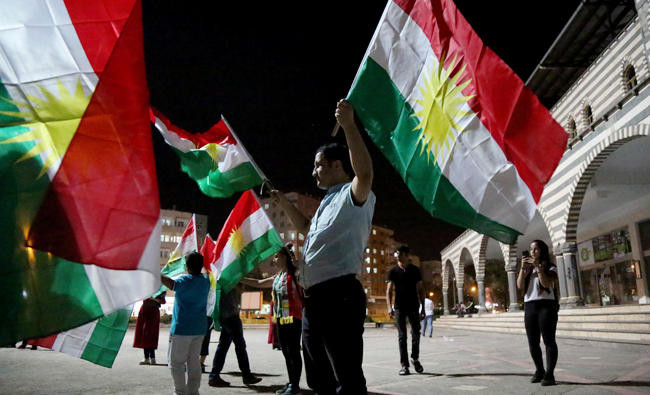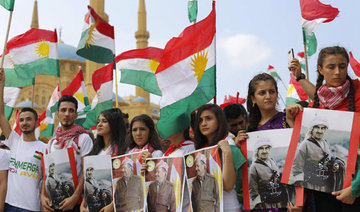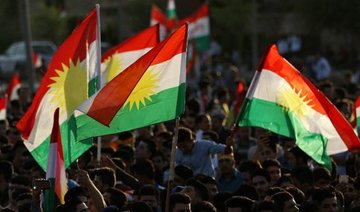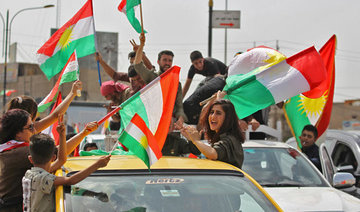ANKARA: As the Kurdistan Regional Government (KRG) has ignored Ankara’s warnings against holding an independence referendum for Iraqi Kurdistan, Turkey is getting ready to implement sanctions.
Its options include closing the Habur border crossing, freezing exports and oil and gas purchases from the KRG, and intensifying diplomatic efforts to convince other regional countries to implement similar measures.
In line with President Recep Tayyip Erdogan’s upcoming visit to Iran on Oct. 4, Ankara also intends to take joint steps with Tehran against the KRG.
Turkey’s top media watchdog RTUK removed the northern Iraq-based Rudaw from satellite broadcasting on the day of the independence vote.
Turkey’s Foreign Minister Mevlut Cavusoglu on Monday said his country’s military will cut its support for training Kurdish Peshmerga forces.
Prime Minister Binali Yildirim said: “We won’t enter an adventure unexpectedly in any way, but if there’s an attitude that will harm the interests of our country, we’ll respond without delay.”
Erdogan took a tougher stance, saying Turkey will not allow the formation of terrorist states along its borders.
“We could come suddenly one night,” he said on Monday. “Irrespective of the result, we see this (referendum) as null and void, and say it’s illegitimate.”
Bilgay Duman, an expert on Iraqi affairs at Ankara-based think tank ORSAM, said the decision to go ahead with the referendum was irresponsible.
He added that KRG President Masoud Barzani’s motives in doing so were to raise the stakes and enhance his bargaining position with Baghdad.
“There’s a serious political crisis going on in the KRG since his opponents rejected extending his term in office in 2015, while financial difficulties were also undermining his authority,” Duman told Arab News.
“Turkey won’t sit and watch developments unfold after the referendum.***It will implement diplomatic, political, economic and military sanctions at the same time.” Duman said Turkey will probably strengthen ties with Baghdad, as shown by the recent visit of the Iraqi Army’s Chief of Staff Othman Al-Ghanmi to Ankara on Saturday.
In reaction to the referendum, both countries’ armies started joint military maneuvers on the Turkish side of the border on Monday evening.
“A new operation by Turkey in northern Iraq’s Sinjar mountains against the Kurdistan Workers’ Party (PKK) may be expected in the near term, considering that the Turkish Parliament on Saturday allowed military operations in northern Iraq,” Duman said.
Closing Habur, the only gateway for the KRG to trade with the world, would suffocate its economy, he added.
“In 2015, during a military operation against PKK hideouts, Turkey closed its border gate for just 22 days, and even the price of a bottle of water skyrocketed at that time,” he said.
But Galip Dalay, research director at Al-Sharq Forum in Istanbul, said he does not expect military ramifications.
“The outcome (of the referendum) will be economic and diplomatic,” Dalay told Arab News. “In the short term, Turkish-KRG relations will suffer. Given the nature of discourse in Turkey, it’s likely that Ankara will take some steps. But I don’t think it will be long-running and drastic.”
Relations between Ankara and Baghdad will improve in the short term due to their opposition to the Kurdish bid for statehood, he said.
“But in the mid-to-long-term, I’m not that optimistic about the relations. Both countries’ strategic orientations and alliance structure remain opposed to each other,” he added.
Turkey readies sanctions against Iraqi Kurds over referendum
Turkey readies sanctions against Iraqi Kurds over referendum

UAE sends 3,000 tonnes of aid on ship bound for Lebanon

DUBAI: The UAE on Friday dispatched a second aid ship carrying 3,000 tonnes of relief materials to Lebanon.
The ship departed Port of Jebel Ali, bound for the Port of Beirut, as part of the “UAE Stands with Lebanon” initiative which started in October.
It carries a wide range of essential aid supplies, such as food, winter clothing and items specifically designed for children and women, state-run WAM reported.
The statement noted that this was the second UAE relief aid ship to carry various relief supplies from UAE donor agencies, humanitarian institutions to Lebanon, noting that the ship was expected to arrive by the end of this month.
The UAE has consistently reaffirmed its unwavering position towards the unity of Lebanon and its national sovereignty since the Israeli escalation in southern Lebanon.
In October, UAE President Sheikh Mohamed bin Zayed directed the delivery of an urgent $100 million relief package to help the people of Lebanon.
16 injured after Israel hit by Yemen-launched ‘projectile’

- According to Israeli media, the projectile fell in the town of Bnei Brak, east of Tel Aviv
- Yemen’s Houthis claim missile attack on central Israel
JERUSALEM: Israel’s military said Saturday it had failed to intercept a “projectile” launched from Yemen that landed near Tel Aviv, with the national medical service saying 14 people were lightly wounded.
“Following the sirens that sounded a short while ago in central Israel, one projectile launched from Yemen was identified and unsuccessful interception attempts were made,” the Israeli military said on its Telegram channel.
Yemen’s Houthi rebels claimed responsibility for the missile attack in central Israel on Saturday, in a statement the Houthis said they had “targeted a military target of the Israeli enemy in the occupied area of” Tel Aviv using a ballistic missile. Israeli rescuers earlier reported 16 wounded in the attack.
Yemen’s Iranian-backed Houthi rebels have repeatedly launched missile attacks against Israel since the war in Gaza began more than a year ago, most of which have been intercepted.
In return, Israel has struck multiple targets in Yemen — including ports and energy facilities in areas controlled by the Houthis.
“A short time ago, reports were received of a weapon falling in one of the settlements within the Tel Aviv district,” Israeli police said Saturday.
According to Israeli media, the projectile fell in the town of Bnei Brak, east of Tel Aviv.
Israel’s emergency medical service said 14 people had been injured.
“Additional teams are treating several people on-site who were injured while heading to protected areas, as well as those suffering from anxiety,” a spokesman said.
The Houthi rebels say they are acting in solidarity with Palestinians and last week pledged to continue operations “until the aggression on Gaza stops and the siege is lifted.”
On December 9, a drone claimed by Houthis exploded on the top floor of a residential building in the central Israel city of Yavne, causing no casualties.
In July, a Houthi drone attack in Tel Aviv killed an Israeli civilian, prompting retaliatory strikes on the Yemeni port of Hodeidah.
The Houthis have also regularly targeted shipping in the Red Sea and the Gulf of Aden, leading to retaliatory strikes on Houthi targets by US and sometimes British forces.
The rebels said Thursday that Israeli air strikes that day killed nine people, after the group fired a missile toward Israel, badly damaging a school.
While Israel has previously hit targets in Yemen, Thursday’s were the first against the rebel-held capital Sanaa.
“The Israeli enemy targeted ports in Hodeida and power stations in Sanaa, and the Israeli aggression resulted in the martyrdom of nine civilian martyrs,” rebel leader Abdul Malik Al-Houthi said in a lengthy speech broadcast by the rebels’ Al-Masira TV.
Israel said it struck the targets in Yemen after intercepting a missile fired from the country, a strike the rebels subsequently claimed.
Houthi spokesman Yahya Saree said they had fired ballistic missiles at “two specific and sensitive military targets... in the occupied Yaffa area,” referring to the Jaffa region near Tel Aviv.
Amnesty slams Hezbollah for unguided rocket fire at Israeli towns

- Amnesty already released the findings of its investigation into Israeli actions during the war
- A fragile ceasefire between Israel and Hezbollah took effect on November 27
BEIRUT: Human rights group Amnesty International on Friday condemned Lebanese militant group Hezbollah for firing salvos of unguided rockets at civilian areas of Israel during the latest conflict.
“Hezbollah’s reckless use of unguided rocket salvos has killed and wounded civilians, and destroyed and damaged civilian homes in Israel,” said Amnesty’s Secretary General Agnes Callamard.
“The use of these inherently inaccurate weapons in or near populated civilian areas amounts to prima facie violations of international humanitarian law,” she said.
“Direct attacks on civilians and civilian objects and indiscriminate attacks that kill and injure civilians must be investigated as war crimes.”
Amnesty said it had documented three Hezbollah rocket attacks on Israeli towns and cities that killed eight civilians and wounded at least 16 others following the escalation of the conflict in late September.
In footage of the attacks, it said it had identified the use of unguided multiple launch rocket systems that violate the bedrock principle of distinction under international humanitarian law.
At the time, Hezbollah announced a series of rocket barrages targeting Israeli population centers in response to Israeli air strikes on Lebanese towns and villages.
Amnesty already released the findings of its investigation into Israeli actions during the war.
It said it had documented unlawful Israeli air strikes that killed 49 civilians, which must be investigated as war crimes.
A fragile ceasefire between Israel and Hezbollah took effect on November 27.
Despite the truce, Israeli air strikes have killed more than 20 people in Lebanon since November 27, according to an AFP tally based on health ministry figures.
Both Israel and Hezbollah accuse each other of repeatedly violating the ceasefire.
Since Hezbollah first started trading cross-border fire with the Israeli army in October 2023, the war has killed more than 4,000 people in Lebanon, according to health ministry figures.
On the Israeli side, the conflict has killed 30 soldiers and 47 civilians, according to an AFP tally based on official figures.
Security for Kurds ‘essential’ for a secure Syria: German FM

- “The view that the PKK/YPG represents the Kurds in Syria is wrong,” the source quoted him as saying, stressing Turkiye would never allow such “terrorist organizations to abuse the situation in Syria”
ANKARA: Security for the Kurdish people is critical for Syria to have a secure future, German Foreign Minister Annalena Baerbock told her Turkish counterpart in Ankara on Friday.
“Security, especially for Kurds, is essential for a free and secure future for Syria,” she told journalists after meeting Turkish Foreign Minister Hakan Fidan, warning of the dangers of any “escalation” with Kurdish forces in Syria.
Earlier Friday, Baerbock raised the alarm over fresh violence in northern Syria, where Turkish troops and Ankara-backed fighters have been battling the Syrian Defense Forces (SDF), a Kurdish-led group supported by the US.
Ankara sees the SDF as an extension of its domestic nemesis, the Kurdistan Workers’ Party (PKK) which has led a decades-long insurgency on Turkish soil, with President Recep Tayyip Erdogan insisting Friday it was “time to neutralize the existing terror organizations in Syria.”
Her comments came as concerns grew over a possible Turkish assault on the Kurdish-held border town of Kobani, also known as Ain Al-Arab, after pro-Turkish fighters seized Manbij and Tal Rifaat, two other key Kurdish-held towns.
As Islamist-led rebels pressed their lightning that toppled Bashar Assad, Turkish-backed fighters began a parallel operation against Kurdish-led forces in the north, sparking clashes that left hundreds dead in just a few days.
“Thousands of Kurds from Manbij and other places are on the run in Syria or are afraid of fresh violence,” the German minister said.
“I made it very, very clear today that our common security interests must not be jeopardized by an escalation with the Kurds in Syria.”
But she expressed understanding for Ankara’s “legitimate” security concerns, saying “northeast Syria must not pose a threat to Turkiye” while also warning that Islamic State (IS) group jihadists must not be allowed to regain a foothold in Syria.
“No one would be helped if the real winner of a conflict with the Kurds turned out to be the terrorists of IS: that would be a security threat for Syria, Turkiye and also for us in Europe.”
According to a foreign ministry source, Fidan told her the PKK and the YPG — the main force within the SDF — did not represent the Kurdish people.
“The view that the PKK/YPG represents the Kurds in Syria is wrong,” the source quoted him as saying, stressing Turkiye would never allow such “terrorist organizations to abuse the situation in Syria.”
“We expect all our allies to respect Turkiye’s security concerns,” he added.
Baerbock also said Berlin would judge Syria’s new Islamist-led HTS rulers on the basis of their actions amid concerns over the group’s Al-Qaeda origins.
“A radical Islamist order will only lead to new fragmentation, new oppression and therefore new violence,” she said.
“We will judge the new rulers by their actions.”
UN extends peacekeeping mission between Syria, Israeli-occupied Golan Heights

- Armed forces from Israel and Syria are not allowed in the demilitarized zone — a 400-square-km (155-square-mile) “Area of Separation” — under the ceasefire arrangement
UNITED NATIONS: The United Nations Security Council on Friday extended a long-running peacekeeping mission between Syria and the Israeli-occupied Golan Heights for six months and expressed concern that military activities in the area could escalate tensions.
Since a lightning rebel offensive ousted Syrian President Bashar Assad earlier this month, Israeli troops have moved into the demilitarised zone — created after the 1973 Arab-Israeli war — that is patrolled by the UN Disengagement Observer Force (UNDOF).
Israeli officials have described the move as a limited and temporary measure to ensure the security of Israel’s borders but have given no indication of when the troops might be withdrawn.
In the resolution adopted on Friday, the Security Council stressed “that both parties must abide by the terms of the 1974 Disengagement of Forces Agreement between Israel and the Syrian Arab Republic and scrupulously observe the ceasefire.”
It expressed concern that “the ongoing military activities conducted by any actor in the area of separation continue to have the potential to escalate tensions between Israel and the Syrian Arab Republic, jeopardize the ceasefire between the two countries, and pose a risk to the local civilian population and United Nations personnel on the ground.”
Armed forces from Israel and Syria are not allowed in the demilitarized zone — a 400-square-km (155-square-mile) “Area of Separation” — under the ceasefire arrangement.
UN Secretary-General Antonio Guterres said on Thursday: “Let me be clear: There should be no military forces in the area of separation other than UN peacekeepers – period.” He also said Israeli airstrikes on Syria were violations of the country’s sovereignty and territorial integrity and “must stop.”




















